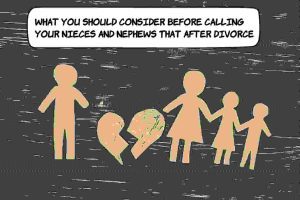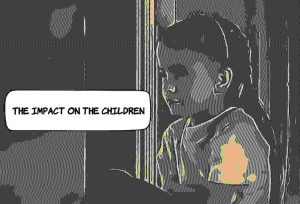Divorce can be a difficult and emotional process for everyone involved, and it often brings up questions about family relationships and legal rights.
One such question that may arise during a divorce is whether or not your nieces and nephews are still considered your family members.
At its core, the question of whether or not you remain related to your nieces and nephews after divorce comes down to the legal concept of affinity. Affinity is a term used to describe the legal relationship between a person and their relatives through marriage or adoption.
In the case of nieces and nephews, affinity is created through the marriage of one’s sibling to their spouse, who then becomes the aunt or uncle of their spouse’s siblings’ children.
However, just because affinity exists does not necessarily mean that a legal relationship is created that would survive a divorce.
In some jurisdictions, a divorce may sever the legal relationship between an aunt or uncle and their nieces and nephews, while in others, the relationship may continue even after a divorce.
In this article, I’ll be answering this nerve-wracking question, we’ll explore things to consider, before finally looking at some of the most frequently asked questions relating to this.
So, sit back and let’s dive into the world of divorce and family relationships
Are They Still Your Same Nieces And Nephews When You Divorce?
Yes, in most cases, your nieces and nephews are still considered your family members even after a divorce. This is because affinity, the legal relationship created through marriage, does not usually end with divorce.
However, the extent of your legal rights and obligations towards your nieces and nephews may be impacted by the specific laws in your jurisdiction and the circumstances of your divorce.
For example, if you had a close relationship with your nieces and nephews before the divorce, you may be able to maintain that relationship even if your legal rights are limited.
On the other hand, if your relationship with your siblings was strained before the divorce, your relationship with your nieces and nephews may be more complicated.
Ultimately, the best approach is to seek legal advice and to work with your family members to maintain positive relationships even in the midst of difficult circumstances.
What You Should Consider Before Calling Your Nieces And Nephews That After Divorce

Divorce is often a difficult and complicated process, especially when children are involved. In many cases, relationships with in-laws can also be strained or even broken as a result.
However, despite the emotional turmoil of a divorce, some former spouses may still wish to maintain a relationship with their ex-in-laws, particularly if they have nieces and nephews that they have grown close to.
While it may seem innocent enough to continue calling your ex-in-laws’ children your nieces and nephews, it is important to consider a few factors before doing so. Here are three things to keep in mind:
1. The feelings of your ex-spouse and their family
It is essential to consider how your actions may affect your ex-spouse and their family. Continuing to refer to their children as your nieces and nephews could be interpreted as a failure to move on from the relationship, and it could be seen as a threat to the new family structure that is being formed.
It is also possible that your ex-in-laws may not want you to continue calling their children your nieces and nephews. They may feel that it is inappropriate or confusing for the children, who may already be struggling with the changes in their family structure.
2.The impact on your own emotional well-being
Maintaining a relationship with your ex-in-laws’ children can be emotionally rewarding, but it can also be emotionally challenging.
It is important to consider how seeing the children and spending time with them may impact your own emotional well-being, especially if the relationship with your ex-spouse and their family is still strained.
Continuing to refer to their children as your nieces and nephews may also make it more difficult for you to move on from the relationship and to establish new boundaries.
It may be helpful to seek the advice of a therapist or counselor before deciding to continue the relationship with your ex-in-laws’ children.
3. The impact on the children

Finally, it is important to consider the impact that continuing to call your ex-in-laws’ children your nieces and nephews may have on the children themselves. While it may be tempting to maintain the relationship you have with them, it is important to consider whether it is in their best interest.
Children can be easily confused by the changing dynamics of a divorce, and continuing to refer to them as your nieces and nephews could add to that confusion. It is important to be clear with the children about the nature of your relationship and to respect the boundaries that their parents have established.
In some cases, it may be more appropriate to take a step back from the relationship with your ex-in-laws children and allow them to adjust to the new family structure without your involvement.
FAQs
Is Your Aunt Still Your Aunt After Divorce?
Yes, your aunt is still your aunt after a divorce. The relationship you have with your aunt is based on your biological connection, not on her marital status. Even if your aunt remarries, she will still be your aunt.
However, your relationship with her ex-spouse may change, and it is up to you to decide whether you want to maintain a relationship with them.
If Your Aunt And Uncle Get Divorced, Is He Still Your Uncle?
Technically, your aunt’s ex-husband is no longer your uncle. However, the relationship you have with him may not change. If you have a close relationship with him, you may still choose to refer to him as your uncle. It is up to you and your family to decide how you want to handle the relationship with your aunt’s ex-husband after the divorce.
If Your Aunt Dies, Is Her Husband Still Your Uncle?
If your aunt dies, her husband, who is your uncle by marriage, may still be considered your uncle. However, this is a personal decision and may depend on the nature of the relationship you had with him and the wishes of your family. It is also possible that he may no longer consider himself part of your family after your aunt’s death.
Final Words
In conclusion, whether or not you remain related to your nieces and nephews after a divorce can be a complex issue that depends on a variety of factors.
While affinity may create a legal relationship, the specific laws in your jurisdiction and the circumstances of your divorce can impact whether or not this relationship continues.
It’s important to seek legal advice and to maintain open and positive communication with your extended family members during this challenging time. With the right approach, it’s possible to maintain a meaningful relationship with your nieces and nephews even after a divorce.
